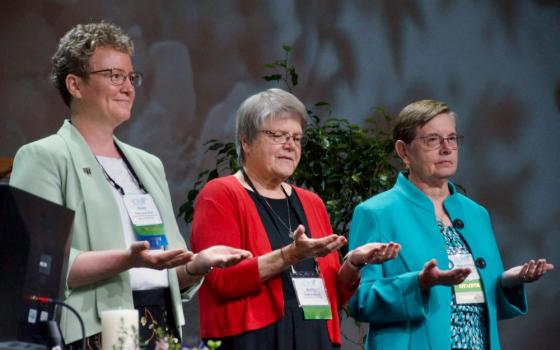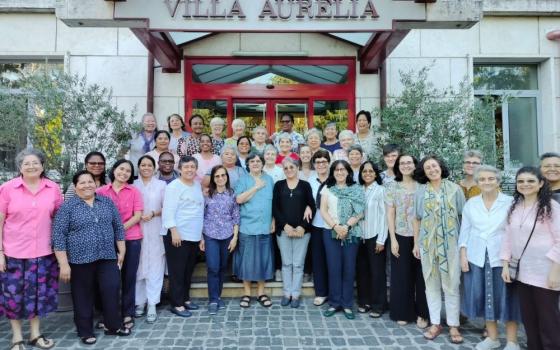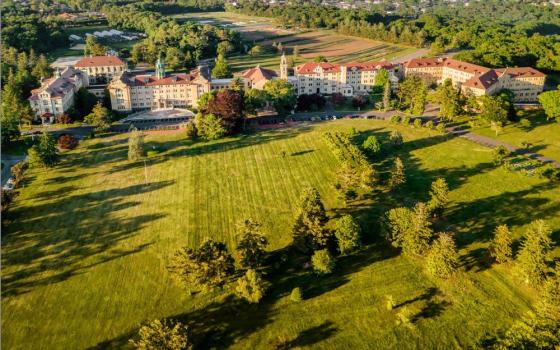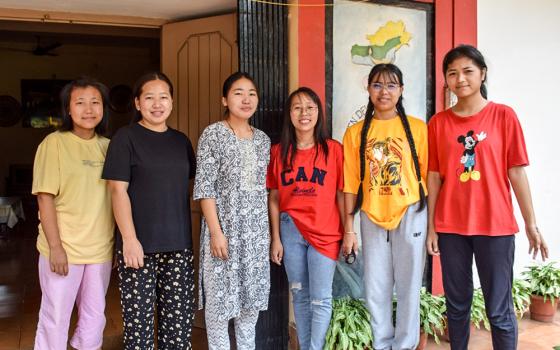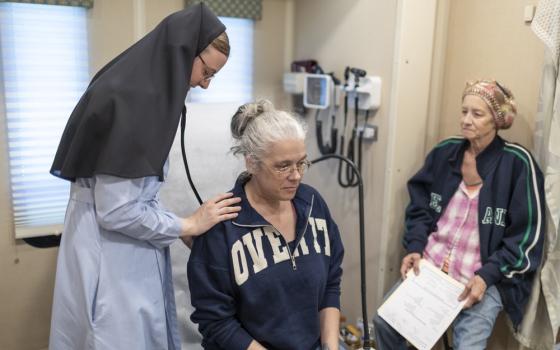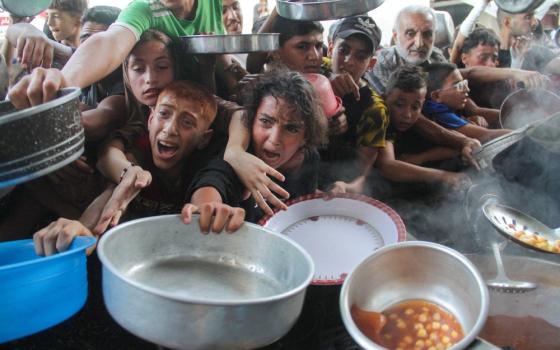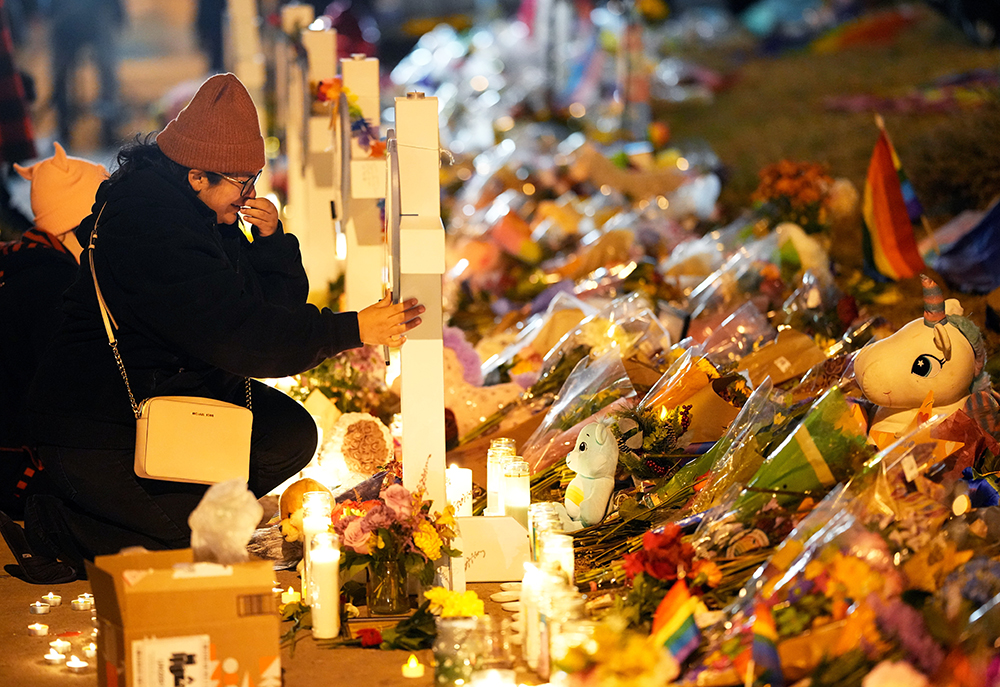
A woman cries at a cross for one of the victims of the Nov. 19 fatal shooting at Club Q during a Nov. 21 candlelight vigil on a corner near the site of the gay bar in Colorado Springs, Colorado. (AP/Jack Dempsey)
Once again, American men have turned guns on people in mass shootings. And once again, women religious are speaking out, decrying the violence and grieving the dead.
Late on Nov. 19, a man walked into an LGBTQ nightclub in Colorado Springs, Colorado, and opened fire, killing five and injuring 18. Police said the shooter was 22-year-old Anderson Lee Aldrich.
The Leadership Conference of Women Religious issued a statement Nov. 21, reiterating its stance against exclusion, violence and hatred.
"We, the members of the Leadership Conference of Women Religious, are committed to work toward a world where reverence for all living beings finds expression in an approach to life free from violence," the statement says. "Our hearts and prayers go out to those family members, friends, and members of the LGBTQ+ community as they grieve the loss of those killed and injured."
The statement noted that simply opposing violence is not enough.
"There can be no tolerance for hate. We pledge ourselves to work for the change of structures and systems that promote messages and actions of violence, particularly those directed towards persons who lack freedom and are denied human dignity," it says. "Our faith requires something more of us. We are called to be instruments of peace."
As it has in the past, LCWR also called for common-sense gun control.
"We again call on our local, state, and federal officials to enact laws that will: require universal background checks for all gun purchases; restrict civilian access to assault weapons and high capacity magazines; make gun trafficking a federal crime; improve access to mental health care and other services for those in need; and fund programs that make available educational materials on the effects of violence and provide opportunities for youth and young adults to end gang violence."
The Adrian Dominicans also issued a statement Nov. 21, calling the incident a hate crime.
"Our hearts ache for the five people who were killed," the statement says. "We pray for the repose of the souls of those who died so cruelly, and for the healing and recovery of all who suffered grievous wounds. We offer deep condolences to family and friends who are mourning the loss of their loved ones."
The statement says there is no place for hate crimes or the angry and venomous language that often precedes such evil acts.
"As women of faith, we believe in the inherent dignity of every person, each one of us wonderfully made (Psalm 139) in the image of God (Genesis 1:27)," it says. "We call on all people of good will to join in doing whatever we can to end the bitter divisiveness that rends our hearts and society with such deadly consequences."
The Ursuline Sisters of Louisville, Kentucky, supported the LCWR statement on Nov. 22 and said their hearts are broken for the family members, friends and members of the community who are grieving.
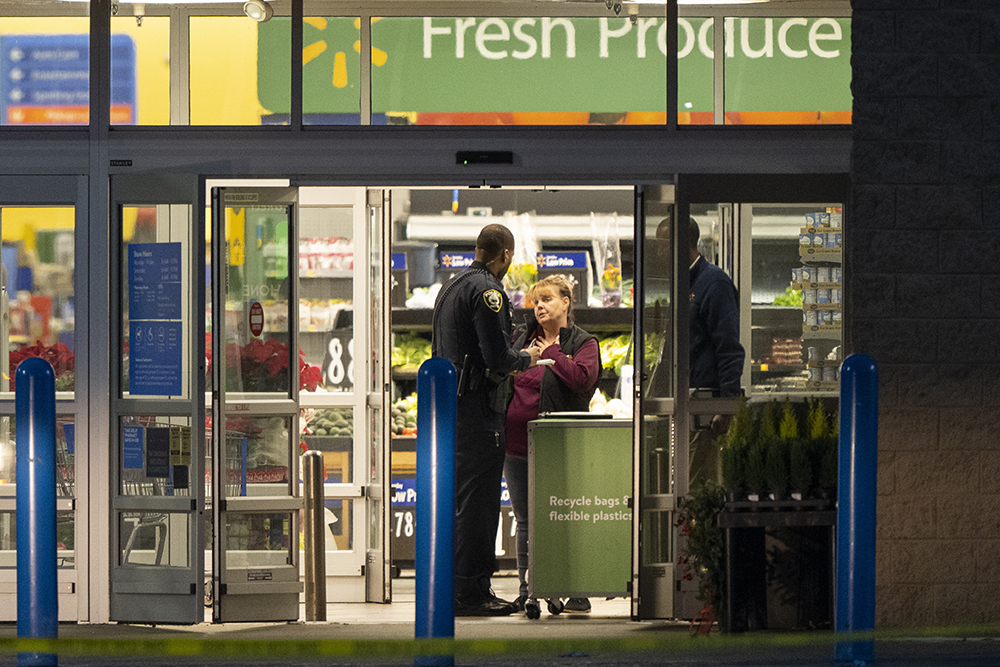
A Walmart employee, center, speaks with law enforcement as they work the scene of a mass shooting Nov. 23 at a Walmart in Chesapeake, Virginia. (AP/Alex Brandon)
But in a sign of just how common mass shootings have become, by the end of Nov. 22, there had been another: six dead in a Walmart store in Chesapeake, Virginia.
That prompted Sr. Jean Anne Zappa, president of the Louisville Ursulines, to issue another statement Nov. 23.
She noted that as of that day, there had been 606 mass shootings in the United States so far in 2022 — there had not yet been a week without at least four — she said the culprit is easy access to guns.
"Many states do not have regulations for training or permits anymore. Many states allow open carry laws," she wrote. "There are those who claim to be pro-life or desire our country to be a Christian nation but are fine about the right to have guns and refuse to support sensible gun safety laws to protect innocent lives."
Then she asked the same questions that went through my mind when I heard the news.
"What are we missing here? What have we lost as a nation when we are only able to resolve anger, conflict, or differences with violence? What happened to basic human respect and decency? What has happened to our ability to have some self-reflection and to think and respond and not react?" she asked. "How do we gain a sense of belonging, responsibility, and a community of caring for one another? What have we lost? Will we be able to recapture it?"
May God have mercy on us all.
Advertisement
Lesotho sister makes and sells wine
Sr. Julia 'Masina Mafike has a sweet hobby: The member of the Congregation of the Handmaids of Christ the Priest in Lesotho keeps bees and uses the honey to make wine, reports Finite Magazine.
Mafike started keeping bees in 2013. Five years later, she tried mixing grapes with her bees' honey to make wine and in two weeks had a wine people loved. She now makes nine different wines through JMM Beekeeping, plus body creams and honey-based herbal flu relief.
Honey can be used on its own to make mead; it can be mixed with grape juice to increase the sugar available to be fermented; or it can be mixed into a dry wine after fermentation to make a sweet wine.
"I was just trying, and had no skills or experience in wine production industry, I tried mixing grapes with honey to make wine and within two weeks the mixture had fermented and turned into wine," Mafike told Finite Magazine.
Mafike was also featured in AWiM News because her bees help preserve biodiversity. She told AWiM News that the region the convent is in was suffering from environmental degradation, loss of biodiversity, and a lack of jobs for the local communities. There was also a need for her congregation to become sustainable in providing food for its members, and JMM Beekeeping helps with all of those issues.
"Our vision is to provide natural remedies that are of medical and nutritional value and to develop a friendly environment for both bees and human beings," she told AWiM News.

